英语语法大全(集锦5篇)
小学英语语法大全(绝对全面)

小学英语语法大全第一章一、定义名词是表示人或事物名称的词。
它既可以表示具体的东西,也可以是表示抽象的东西。
二、分类1. 名词可以根据意义分为普通名词和专有名词如:john is a studentstudent是普通名词,john是专有名词普通名词前可以用不定冠词a/an, 定冠词the 或不加冠词,专有名词前一般不加冠词,专有名词的首字母要大写。
2。
普通名词又可以分为个体名词、集体名词、物质名词和抽象名词,其中个体名词与集体名词是可数名词,物质名词和抽象名称是不可数名词.3. 专有名词专有名词是表示人名、地名、团体、机构、组织等的专有名词,多为独一无二的事物.三、名词的数1、名词分为可数名词和不可数名词。
可数名词—-可以数的名词不可数名词-—数不清(没有复数)drink?milk tea water orange juice coke coffee porridgefood?rice bread meat fish fruit cake dumplings2、可数名词与不定冠词a(an)连用有数数形式,不可数名词不能与不定冠词a(an)连用,没有复数形式many+可数名词复数much/a little+不可数名词some, any , a lot of (lots of) 两者都可以修饰。
3、可数名词可以直接用数词来修饰不可数名词数词 +量词 +of + 名词对可数名词的数量提问用how many对不可数名词的数量提问用 how much4、不可数名词的量有以下两种表示方法:1) some, much ,a little ,a lot of ,a bit of , plenty of 用等表示多少。
注意既可以与可数名词复数,又可以与不可数名词连用的有:plenty of ,some ,a lot of ,lotsof ,most of 等.如there is much water in the bottle 。
初中英语语法大全(总结篇)
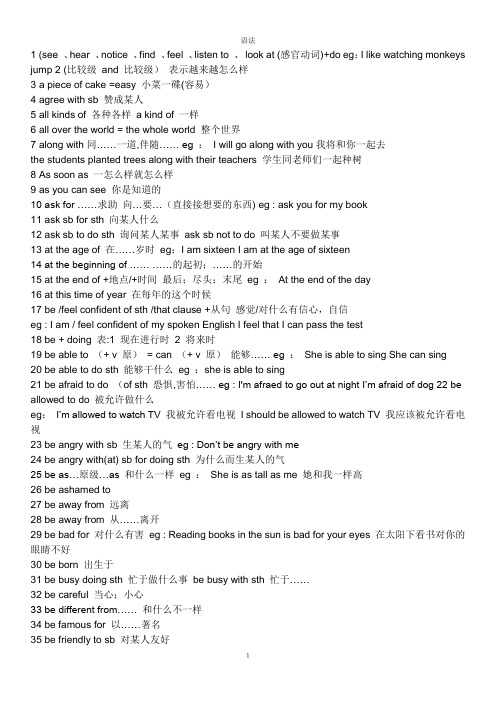
1 (see 、hear 、notice 、find 、feel 、listen to 、look at (感官动词)+do eg:I like watching monkeys jump2 (比较级and 比较级)表示越来越怎么样3 a piece of cake =easy 小菜一碟(容易)4 agree with sb 赞成某人5 all kinds of 各种各样a kind of 一样6 all over the world = the whole world 整个世界7 along with同……一道,伴随…… eg :I will go along with you我将和你一起去the students planted trees along with their teachers 学生同老师们一起种树8 As soon as 一怎么样就怎么样9 as you can see 你是知道的10 ask for ……求助向…要…(直接接想要的东西) eg : ask you for my book11 ask sb for sth 向某人什么12 ask sb to do sth 询问某人某事ask sb not to do 叫某人不要做某事13 at the age of 在……岁时eg:I am sixteen I am at the age of sixteen14 at the beginning of …… ……的起初;……的开始15 at the end of +地点/+时间最后;尽头;末尾eg :At the end of the day16 at this time of year 在每年的这个时候17 be /feel confident of sth /that clause +从句感觉/对什么有信心,自信eg : I am / feel confident of my spoken English I feel that I can pass the test18 be + doing 表:1 现在进行时2 将来时19 be able to (+ v 原)= can (+ v 原)能够…… eg :She is able to sing She can sing20 be able to do sth 能够干什么eg :she is able to sing21 be afraid to do (of sth 恐惧,害怕…… eg : I'm afraed to go out at night I’m afraid of dog 22 be allowed to do 被允许做什么eg:I’m allowed to watch TV 我被允许看电视I should be allowed to watch TV 我应该被允许看电视23 be angry with sb 生某人的气eg : Don’t be angry with me24 be angry with(at) sb for doing sth 为什么而生某人的气25 be as…原级…as 和什么一样eg :She is as tall as me 她和我一样高26 be ashamed to27 be away from 远离28 be away from 从……离开29 be bad for 对什么有害eg : Reading books in the sun is bad for your eyes 在太阳下看书对你的眼睛不好30 be born 出生于31 be busy doing sth 忙于做什么事be busy with sth 忙于……32 be careful 当心;小心33 be different from…… 和什么不一样34 be famous for 以……著名35 be friendly to sb 对某人友好136 be from = come from 来自eg :He is from Bejing He comes from Bejing Is he from Bejing ?Does he come from Bejing ?37 be full of 装满……的be filled with 充满eg: the glass is full of water the glass is filled with water38 be glad+to+do/从句39 be going to + v(原)将来时40 be good at(+doing)= do well in 在某方面善长, 善于……41 be good for 对什么有好处eg : Reading aloud is good for your English42 be happy to do 很高兴做某事43 be helpful to sb 对某人有好处eg : Reading aloud is helpful to you 大声朗读对你有好处Exercising is helpful to your bady 锻炼对你的身体有好处44 be in good health 身体健康45 be in trouble 处于困难中eg : She is in trouble They are in tronble46 be interested in 对某方面感兴趣47 be late for = come late to 迟到eg:Be late for class 上课迟到48 be like 像…… eg :I'm like my mother49 be mad at 生某人的气50 be made from 由……制成(制成以后看不见原材料)51 be made of 由……制成(制成以后还看得见原材料)52 be not sure 表不确定53 be on a visit to 参观54 be popular with sb 受某人欢迎55 be quiet 安静56 be short for 表**的缩写eg:陶is short for 陶俊杰57 be sick in bed 生病在床58 be sorry to do sth be sorry for sb eg : I am sorry for you59 be sorry to hear that 60 be sorry to trouble sb eg :I am sorry to trouble you61 be strict in doing sth 严于做某事eg :He’s strict in obeying noles62 be strict with sb 对某人要求严格eg:Some students are not strict with them selves 这些学生对自己不严格63 be strict with sb in sth 某方面对某人严格64 be supposed to do 被要求干什么65 be sure 表确定66 be sure of doing sth 对做某事有信心eg:He is sure of winning I am sure of learning English well67 be sure of sth 对做某事有信心eg:I’m sure of my head (my teacher 我相信我的大脑(老师)68 be sure that sth 对做某事有信心eg: I’m suer that he can pass the test 我相信他能通过考试69 be sure to do sth一定会做某事eg:We are sure to pass the test 我们一定会通过这次考试We are sure to learn English well 我们一定能学好英语70 be terrified of + 名/动doing 害怕……271 be terrified to do sth 害怕做某事72 be the same as …和什么一样73 be used to doing sth 习惯做某事eg:My father is used to getting up early 我爸爸习惯早He is used to sleeping in class 他习惯上课睡觉74 be worth doing 值得做什么75 be(feel)afraid to do sth 害怕做某事be afraid of sth 害怕某物be afraid that 丛句76 because+句子because of +短语eg :He was late because he had a headache He was late because of his headache77 begin to do = start to do 开始做某事start…with…=begin…with… 以什么开始什么eg :Let’s begin the game with the song I begin to go home78 between…and… 两者之间79 borrow sth from sb 向……借…… lend sth to sb (lend sb sth 借给……什么东西eg :I borrowed a pen from him he lent a pen to me (he lent me a pen80 both = the same(as) = not different(from)表相同81 bother 打扰bother sb to do stheg :I’m sorry to bother you ,but can you tell me to way to the station我十分道歉打扰你,但是你能告诉我怎么去车站the problem has been bothering me for weeks 这个问题困扰了我几个周了He’s bothering me to lend him money82 by the end of 到……为止83 call sb sth eg :We call him old wang84 care 关心eg :Don’t you care about this country’s futu re ?你为什么不关心国家的未来85 catch up with sb 赶上某人86 chat with sb 和某人闲谈take sb to + 地点带某人去某地87 come in 进88 come over to 过来89 come up with 提出eg:Can you come up with a good idea 你能想出一个好办法吗?90 communicate with sb 和某人交流91 consider + doing 考虑做什么eg :Why not consider going to lu zhou 为什么不考虑去泸州?92 dance to 随着……跳舞eg :She likes dancing to the music 她喜欢随着音乐跳舞93 decide to do sth 决定做某事94 do a survey of 做某方面的调查95 do better in 在……方面做得更好96 do wrong 做错97 Don't forget to do sth 不要忘了做某事98 Don't mind +doing /从句/名词不要介意……99 each +名(单)每一个…eg :Each student has many books 每一个学生都有一些书100 end up +doing101 enjoy +doing喜欢3102 escape from 从……逃跑eg:The prisoners have escaped from the prison犯人从监狱里逃跑出来103 expect to do sth 期待做某事104 fall down 摔下来fall off 从哪摔下来105 fall in love with sb /sth 爱上什么106 far from 离某地远eg :The school is far from my home107 find +it +adj +to do 发现做某事怎么样108 find sb/sth +adj 发现什么怎么样eg :I find the book interesting109 finish 完成+doing(名词)110 fit to sb = be fit for sb 适合某人111 forget to do 没有做而忘了forget doing 做了而又忘了eg:Don’t forget to go home I forget closing door112 from…to… 从某某到某某eg:From me for her113 get /have sth down 做完,被(别人)做…eg: I have my hair cut 我理了发(头发被剪了)Tom got his bad tooth pulled out 汤母把他的坏牙拔掉了(被牙医拔掉了)114 get a part-time job= find a part—time job115 get along well with sb = get on well with sb 与某人相处得好116 get along with sb = get on with sb 与某人相处117 get ready for = be ready for为什么而准备eg : I get ready for math I am ready for math 118 get sb in to trouble 给某人麻119 get sb to do sth120 get…from… 从某处得到某物121 give a talk 做报告eg:He is give a tall122 give sth to sb give sb sth 给某人某物123 go fish 钓鱼go swimming 游泳124 go on to do 去做下一件事go on doing 继续做这件事125 go out away from go out of126 go to school 上学(用于专业的)go to the school 去学校(不一定是上学)127 good way to 好方法128 hate to do 讨厌没做过的事hate doing 讨厌做过的事129 have a party for sb 举办谁的晚会130 have a talk 听报告谈一谈131 have been doing 现在完成进行时eg : You have been talking You have been sleeping since 132 ha ve been to …( 地方)……去过某过地方have gone to …(地方)去了某地还没回来133 have fun +doing 玩得高兴134 have sth to do 有什么事要做eg:I have a lot of homework to do 我有很多家庭作业要做I have nothing to do 我没什么事情做135 have to do sth 必须做某事136 have trouble (problem)(in) doing sth 做什么事情有麻烦137 have…time +doing4138 have…(时间)…off 放……假eg:I have month off 我请一个月得假139 hear sb +do/doing 听见某人做某事/正在做某事140 help a lot 很大用处141 help sb with sth \one's sth 帮助某人某事(某方面)help sb (to) do sth 帮助某人做某事142 hope to do sth 希望做某事143 How about(+doing)= What about(+doing)144 how do you like = what do you think of 你对什么的看法145 if : 是否=wethereg: I don’t know if (wether)I should go to the party 我不知道我是否应该去参加晚会He don't know if (wether)we will arrive on time tomorrow morning 他不知道我们明天早上是否能准时到达146 if :如果,假如(全部接一般时态)+条件语态从句eg:I’ll go to LuZhou if it does’t rain 假如明天不下雨,我就去泸州If they change the plan they will let me know 假如他们要改变计划,他们会让我知道的I’ll go to England ,if I have enough money next year 如果我明年由足够的钱,我就要去英国147 in one’s opinion = sb think 某人认为148 in some ways 在某些方面149 in the end = finally(adv)最后150 in the north of… 什么在什么的北方(north 北sowth 南west 西east 东)151 in the sun 在太阳下152 increase 增加eg : They’ve increased the prece of petrol by 3% 他们把石油价增加了3%the population has increased from 12 million ten years ago to 18 million now153 instead of +(名) 代替eg:I’d like an apple instead of a pear 我想要苹果,而不要梨子I like English instead of math 我喜欢英语而不喜欢数学154 introduce sb to sb 介绍某人给某人introduce oneself 自我介绍155 invite sb to do sth 邀请某人做某事156 It takes sb sometime to do sth 做某人花掉某人多少时间eg : It took me 5 minutes to do my homework It takes me half an hour to cook157 It’s +adj +for sb to do sth 对某人来说做某事怎么样158 It’s +adj +to do 做某事怎么样159 It’s +adj for sb 对于某人来说怎么样It’s +adj of sb 对某人来说太怎么样160 It’s +adj(for sb)to do(对某人来说)做某事怎么样It’s +adj of sb to do sth 对某人来说做某事太怎么样eg : It’s nice of you to help me with my English161 It’s a good idea for sb to do sth 对…… 来说是个好主意162 It’s important to sb 对某人来说很重要eg:It's important to me163 It's t ime to do sth It’s time for sth 到了该去做某事的时间eg : It’s time to have class It's time for class 该去上课了5164 join = take part in 参加165 just now 刚才166 keep +sb /sth +adj /介词短语让什么保持什么样?167 keep out 不让…… 进入168 keep sb adj 让……保持…… eg: I want to keep my mo ther happy keep healthy 保持健康169 key to +名词表示:某物的钥匙或某题的答案170 key to… anser to … key 可以是答题或钥匙171 laugh at… 取笑…… eg :Don't langh at others We langhed at the joke172 learn by oneslfe 自学173 learn from sb 向某人学习eg:We should learn from Lei Feng174 learn to do sth 学做某事175 let sb do sth 让某人做某事176 Let sb down 让某人失望eg :We shouldn’t let our farents down 我们不应该让我们的父母失望177 live from :离某地远178 live in +大地方/at +小地方居住在某地eg:I live in LuZhou She lives at XuanTan179 look after = take care of 照顾照看180 lose one’s way 谁迷路eg : Lose your way 你迷路181 make a decision to do sth 决定做某事182 make friends with sb 和谁成为朋友eg : I want to make friends with you183 make it early 把时间定的早一点184 make on exhibition of oneself 让某人出洋相185 make sb /n +n 使什么成为什么eg : I made her my step moller I made you my wife186 make sb /sth +adj 使某人(某物)怎么样eg :You must made your bed clean187 make sb /sth adj 使某人/某物怎么样188 make sb do sth 让某人做某事eg :I made him write 我以前让他写189 make up be made up of (被动语态)由……组成190 make…difference to…191 mind sb to do mind one's doing 介意……做什么192 most +名most of +代193 much too +形容词194 must be 一定195 need +名词196 need sb do sth 需要某人做某事197 need to do (实义动词) need do (情态动词)198 no /neithr of hate to do no /neithr of hate doing199 no +名词200 not anymore = no more 再也不…… eg: He didn't cry any more He cried no more 他再也不哭201 not… (形、副)at all eg:He’s not tall at all she doesn’t junp far at all202 not…at all 一点都不6203 not…either 表否定,也不eg :I don't japanse either I don’t have sister, either 我也没有姐姐204 not…until 直到……才……eg:I didn’t sleep until my mother came back The child didn’t stop crying until I give her sugar 205 offer / provide sb with sth 给某人提供206 offer sb sth ( offer sth to sb 提供什么东西给某人eg :I offer you water (I offer water to you 我给你提供水207 on one's way to… 在谁去那的路上208 on the one hand 一方面on the other hand 另一方面209 on the phone = over the phone 用电话交谈210 on time 准时in time 及时211 one day =some day =someday 一天,有一天212 one of +可数名词的复数形式213 one to another 一个到另一个214 over and over agin 一遍又一遍的eg :He cleaned the floor over and over agin215 part-time job 兼职工作fall-time job 全职工作216 pay for… 付……钱pay the bill 开钱,付钱217 please +do218 please help yourself219 pleased with sb220 pool into = pore into221 practice +doing 练习做某事222 prefer sth to sth 相对……更喜欢…… eg :I prefer physics to chemisty 在物理和化学中,我更喜欢物理prefer doing to sth 更喜欢去做…不愿意去做… eg:He prefers riding a bike to diving 他更喜欢骑自行车,不开小车prefer to do sth rather than do sth 宁愿做…也不愿eg:My unde prefers to buy a now car rather than repaiv the used one 我叔叔更喜欢买新的车,也不去修旧车prefer sb not to do sth 更愿意… eg:I prefer her not to come 我不喜欢她不来223 pretend to do sth 装着去做什么pretend that 从句eg :The two cheats pretended to be working very hard 这两个骗子装着努力工作He pretended that he did not know the answer 他装着不知道答案224 rather…than 宁可……也不……eg :I would rather be a doctor than a teacher 我愿肯当医生,也不当老师He likes dogs rather than cats 他喜欢狗,不喜欢猫225 regard…as 把……当作……eg: Please give my best regards to your family 请带我向你的家人我最好的问候I regard you as my friend 我把你当作我的朋友He shows little regard for others 他不爱关心别人226 remid sb about sth 提醒某人什么事remid sb to do sth 提醒某人做某事7eg :he remids me about cooking (he remids me to cook 他提醒我做饭227 remid sb of sth 使某人想起什么eg : the pictures remind me of my school days 这照片使我想起了我的学校the words that (which)the teacher talke to remind me of my mother228 return sth to sb 还什么东西给某人229 say to oneself 对自己说230 say to sb 对某人说231 sb spend somemoney on sth 花了多少钱在某事上232 sb spend sometime with sb 花了多少时间陪谁233 sb spend sometime(in) doing sth 花了多少时间做某事234 sb with sb +is sb and sb +are235 see sb do 看见某人做过某事see sb doing 看见某人正在做某事236 seem to do/be +adj 显得怎么样eg : You seem to be tired You seem to be happy237 send +sb sth 送给某人某物238 send…to…把什么寄到哪里去?239 shock 使……震惊eg :Oh , It’s only you !You give me a shock 啊,是你呀!吓我一跳240 show sb sth 向某人展示某物eg : I show her the book。
九年级英语外研版知识点(集锦5篇)
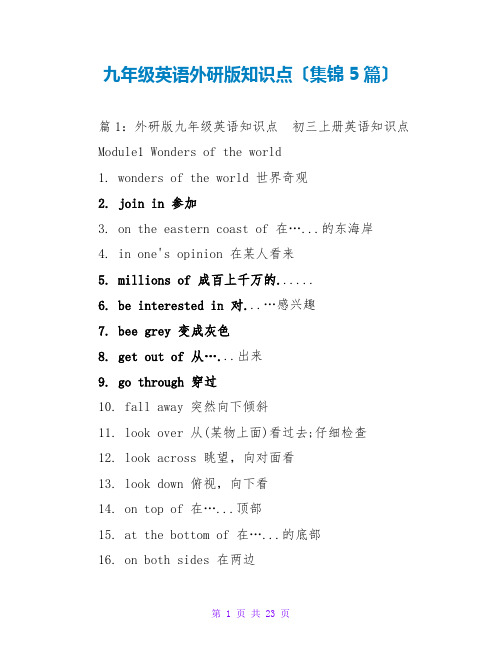
九年级英语外研版知识点〔集锦5篇〕篇1:外研版九年级英语知识点初三上册英语知识点Module1 Wonders of the world1. wonders of the world 世界奇观2. join in 参加3. on the eastern coast of 在…...的东海岸4. in one's opinion 在某人看来5. millions of 成百上千万的......6. be interested in 对...…感兴趣7. bee grey 变成灰色8. get out of 从…...出来9. go through 穿过10. fall away 突然向下倾斜11. look over 从(某物上面)看过去;仔细检查12. look across 眺望,向对面看13. look down 俯视,向下看14. on top of 在…...顶部15. at the bottom of 在…...的底部16. on both sides 在两边17. look like 看起来像18. be famous for 因…...出名19. do an interview 做采访20. draw a picture of 画一幅…...的图画21. go down 下去,下沉22. high up 在高处23. more than 超过24. dozens of 数十个,许多25. in height 高度,在高度上Module2 Public holidays1. as soon as 一…...就......2. take a vacation 度假3. have a picnic 野餐4. play music 演奏音乐5. go somewhere interesting 去有趣的地方6. make short speeches 做简短的演讲7. give thanks for 感谢......8. grow corn 种植玉米九年级上学期英语课文知识点外研版所谓垂悬构造(The Dangling Construction)就是一个句子成分,如分词短语,不定式动词短语等,找不到被修饰的主语或被修饰的对象不合逻辑。
人教版初二(下)英语:unit 5语法篇(教师版)

人教版初二(下)英语:unit 5语法篇(教师版)Unit 5 语法篇____________________________________________ __________________________________________________________________________________ ______________________________________学生通过本讲学习,能够掌握本单元的重点语法,并在综合能力上有一定的拓展。
when while 的区别和用法一、while的意思是“在……同时(at the same time that )”“在……期间(for as long as, during the time that)”。
从while的本身词义来看,它只能表示一段时间,不能表示具体的时间点。
在时间上可以是“线线重合”或“点线重合”,但不能表示“点点重合”。
例如:1、He was watching TV while she was cooking. 她做饭时,他在看电视。
(线线重合)2、He was waiting for me while I was working. 我工作的时候,他正等着我。
(线线重合)3、He asked me a question while I was speaking. 我在讲话时,他问了我一个问题。
(点线重合)二、when的意思是“当……时候(at the time that)”“无论什么时候(whenever)” “一……就……期间”时,其谓语通常只能是那些含有动作(action)和发展(development)意味的动词,一般不能是那些不用于进行时态的动词(如be,seem,love,want,agree,see,know,have等),所以下面一句中的while 不能换为as:A:I’m going to the post office. 我要去邮局。
2023年6月英语四级语法练习及答案(5篇)
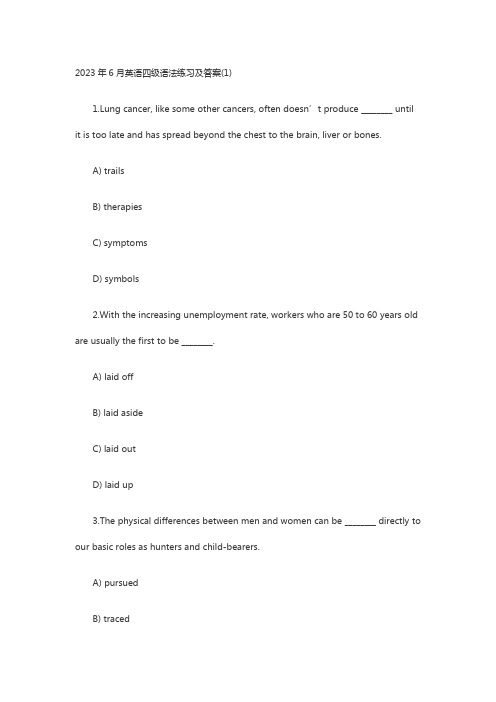
2023年6月英语四级语法练习及答案(1)1.Lung cancer, like some other cancers, often doesn’t produce ________ until it is too late and has spread beyond the chest to the brain, liver or bones.A) trailsB) therapiesC) symptomsD) symbols2.With the increasing unemployment rate, workers who are 50 to 60 years old are usually the first to be ________.A) laid offB) laid asideC) laid outD) laid up3.The physical differences between men and women can be ________ directly to our basic roles as hunters and child-bearers.A) pursuedB) tracedC) switchedD) followed4.It is clear that the dog has a much greater ________ of its brain devoted to smell than is the case with humans.A) compositionB) compoundC) percentD) proportion5.American college students are increasingly ________ with credit card debt and the consequences can be rather serious.A) boostedB) burdenedC) dischargedD) dominated1.答案:C参考译文:肺癌和其他癌症一样经常没有症状直到晚期扩散到脑、肝和骨头才会有症状产生。
英语语法大全(精心整理)
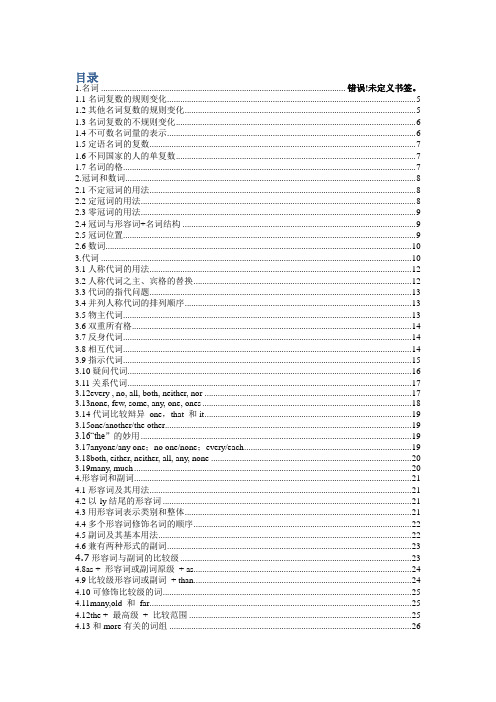
目录1.名词 ............................................................................................................... 错误!未定义书签。
1.1名词复数的规则变化 (5)1.2其他名词复数的规则变化 (5)1.3名词复数的不规则变化 (6)1.4不可数名词量的表示 (6)1.5定语名词的复数 (7)1.6不同国家的人的单复数 (7)1.7名词的格 (7)2.冠词和数词 (8)2.1不定冠词的用法 (8)2.2定冠词的用法 (8)2.3零冠词的用法 (9)2.4冠词与形容词+名词结构 (9)2.5冠词位置 (9)2.6数词 (10)3.代词 (10)3.1人称代词的用法 (12)3.2人称代词之主、宾格的替换 (12)3.3代词的指代问题 (13)3.4并列人称代词的排列顺序 (13)3.5物主代词 (13)3.6双重所有格 (14)3.7反身代词 (14)3.8相互代词 (14)3.9指示代词 (15)3.10疑问代词 (16)3.11关系代词 (17)3.12every , no, all, both, neither, nor (17)3.13none, few, some, any, one, ones (18)3.14代词比较辩异one,that 和it (19)3.15one/another/the other (19)3.16“the”的妙用 (19)3.17anyone/any one;no one/none;every/each (19)3.18both, either, neither, all, any, none (20)3.19many, much (20)4.形容词和副词 (21)4.1形容词及其用法 (21)4.2以-ly结尾的形容词 (21)4.3用形容词表示类别和整体 (21)4.4多个形容词修饰名词的顺序 (22)4.5副词及其基本用法 (22)4.6兼有两种形式的副词 (23)4.7形容词与副词的比较级 (23)4.8as + 形容词或副词原级+ as (24)4.9比较级形容词或副词+ than (24)4.10可修饰比较级的词 (25)4.11many,old 和far (25)4.12the + 最高级+ 比较范围 (25)4.13和more有关的词组 (26)5.1系动词 (27)5.2什么是助动词 (28)5.3助动词be的用法 (28)5.4助动词have的用法 (29)5.6助动词shall和will的用法 (30)5.7助动词should和would的用法 (30)5.8短语动词 (30)6.动名词 (31)6.1动名词作主语、宾语和表语 (31)7动词不定式 (32)7.1不定式作宾语 (32)7.2不定式作补语 (32)7.3不定式主语 (33)7.4It's for sb.和It's of sb. (34)7.5不定式作表语 (34)7.6不定式作定语 (34)7.7不定式作状语 (34)7.8用作介词的to (34)7.9省to 的动词不定式 (35)7.10动词不定式的否定式 (35)7.11不定式的特殊句型too...to (36)7.13不定式的特殊句型Why not (36)8.特殊词精讲 (37)8.1stop doing/to do (37)8.2forget doing/to do (37)8.3remember doing/to do (37)8.4regret doing/to do (37)8.6try doing/to do (38)8.7go on doing/to do (38)8.8be afraid doing/to do (38)8.9be interested doing/to do (38)8.10mean to doing/to do (39)8.11begin (start)doing/to do (39)8.12感官动词+ doing/to do (39)9.分词 (39)9.1分词作定语 (39)9.4分词作补语 (41)9.5分词作表语 (41)9.6分词作插入语 (41)9.7分词的时态 (41)10.独立主格 (42)10.1独立主格 (42)10.2With的复合结构 (42)11.动词的时态 (43)11.1一般现在时的用法 (43)11.3used to / be used to (44)11.4一般将来时 (44)11.5be going to / will (45)11.6be to和be going to (45)11.7一般现在时表将来 (45)11.8用现在进行时表示将来 (45)11.11用于现在完成时的句型 (46)11.12比较since和for (47)11.14延续动词与瞬间动词 (47)11.17将来完成时 (48)11.26一般现在时代替进行时 (50)11.27现在进行时代替将来时 (51)11.28时态一致 (51)1.29时态与时间状语 (51)12.动词的语态 (51)12.1Let的用法 (51)12.2短语动词的被动语态 (52)12.3表示"据说"或"相信" 的词组 (52)13.句子的种类 (53)13.1句子的种类 (54)13.4用助动词进行强调 (56)14.倒装 (58)14.1倒装句之全部倒装 (58)14.2倒装句之部分倒装 (58)14.4so, neither, nor作部分倒装 (59)14.5only在句首要倒装的情况 (59)14.6as, though 引导的倒装句 (59)14.7其他部分倒装 (60)15.主谓一致 (60)15.1并列结构作主语谓语用复数 (60)15.6与后接名词或代词保持一致 (61)16.虚拟语气 (61)16.1真是条件句 (62)16.2非真实条件句 (62)16.4虚拟条件句的倒装 (63)16.7比较if only与only if (64)16.8It is (high) time that (64)17.名词性从句 (64)17.1引导名词性从句的连接词 (65)17.2名词性that-从句 (65)17.3名词性wh-从句 (66)18.定语从句 (67)18.1关系代词引导的定语从句 (67)18.2关系副词引导的定语从句 (68)18.9关系代词that 的用法 (70)19.状语从句 (70)19.1地点状语从句 (70)19.2方式状语从句 (70)19.3原因状语从句 (71)19.4目的状语从句 (71)19.5结果状语从句 (71)19.6条件状语从句 (72)19.7让步状语从句 (72)19.8比较while, when, as (73)19.9比较until和till (73)19.10表示"一...就..."的结构 . (73)20.1并列连词与并列结构 (74)20.2比较and和or (74)20.3表示选择的并列结构 (75)20.4表示转折或对比 (75)20.5表原因关系 (75)20.6比较so和such (76)21.情态动词 (76)21.1情态动词的语法特征 (76)21.3比较may和might (76)21.4比较have to和must (77)21.5must表示推测 (77)21.6表示推测的用法 (77)21.7情态动词+ have +过去分词 (78)21.8should 和ought to (78)21.9had better表示"最好" (78)21.10would rather表示"宁愿" (79)21.14比较need和dare (80)22介词 (80)22.1介词的句法功能 (80)22.2主要介词区别 (80)1.名词名词可以分为专有名词(Proper Nouns)和普通名词(Common Nouns),专有名词是某个(些)人,地方,机构等专有的名称,如Beijing,China等。
初中英语语法冠词教案(全文5篇)

初中英语语法冠词教案(全文5篇)第一篇:初中英语语法冠词教案第4单元冠词(一)不定冠词a,an1表示人或事物的某一类(含义相当于一类事物的任何一个)『例』My father is a driver.Do you like an apple or a pear? She is a girl.A horse is an animal.An elephant is bigger than a horse.A monkey can climb trees.2a用于辅音音素开头的词前,an用于元音音素开头的词前。
『例』a university,an hour,an honest boy3用于表示数量、时间的名词前,表示“每一”的意思,但数的概念没有one强烈。
『例』The plan will be ready in a day or two.有些不可数名词要表示“一种”、“一场”、“一堆”时,须加不定冠词『例』a heavy snow, a strong wind, make a fire,have a good time5用于某些固定短语中『例』a lot of,in a hurry, leave a message, half an hour,a moment ago,have a rest(二)定冠词1.特指某个或某些人或事物,或指谈话双方都知道的人或事物,或重复上文提过的人或事物。
『例』How do you like the film?I have got a picture.The picture is very nice.2.用于指世界上独一无二的事物。
『例』 the sun the moon the earth The earth is bigger than the moon, but smaller than the sun.3.定冠词the用于序数词前或表示方位的名词前和形容词最高级前或“same/only/very+名词”前。
最新仁爱版八年级英语上册语法集锦大全
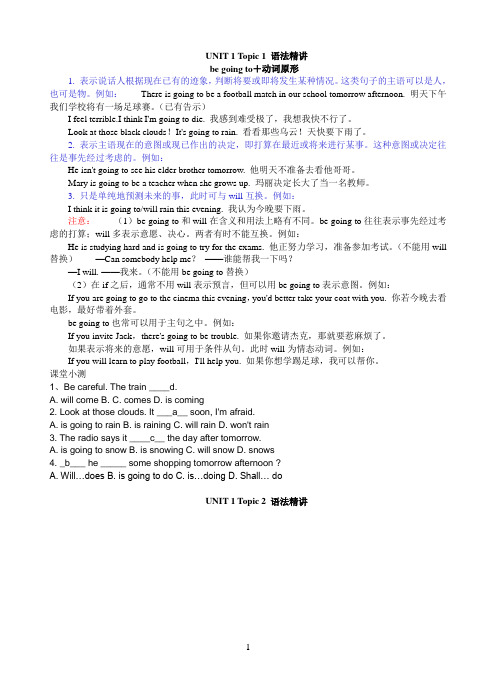
UNIT 1 Topic 1 语法精讲be going to+动词原形1. 表示说话人根据现在已有的迹象,判断将要或即将发生某种情况。
这类句子的主语可以是人,也可是物。
例如:There is going to be a football match in our school tomorrow afternoon. 明天下午我们学校将有一场足球赛。
(已有告示)I feel terrible.I think I'm going to die. 我感到难受极了,我想我快不行了。
Look at those black clouds!It's going to rain. 看看那些乌云!天快要下雨了。
2. 表示主语现在的意图或现已作出的决定,即打算在最近或将来进行某事。
这种意图或决定往往是事先经过考虑的。
例如:He isn't going to see his elder brother tomorrow. 他明天不准备去看他哥哥。
Mary is going to be a teacher when she grows up. 玛丽决定长大了当一名教师。
3. 只是单纯地预测未来的事,此时可与will互换。
例如:I think it is going to/will rain this evening. 我认为今晚要下雨。
注意:(1)be going to和will在含义和用法上略有不同。
be going to往往表示事先经过考虑的打算;will多表示意愿、决心。
两者有时不能互换。
例如:He is studying hard and is going to try for the exams. 他正努力学习,准备参加考试。
(不能用will 替换)—Can somebody help me?——谁能帮我一下吗?—I will. ——我来。
(不能用be going to替换)(2)在if之后,通常不用will表示预言,但可以用be going to表示意图。
- 1、下载文档前请自行甄别文档内容的完整性,平台不提供额外的编辑、内容补充、找答案等附加服务。
- 2、"仅部分预览"的文档,不可在线预览部分如存在完整性等问题,可反馈申请退款(可完整预览的文档不适用该条件!)。
- 3、如文档侵犯您的权益,请联系客服反馈,我们会尽快为您处理(人工客服工作时间:9:00-18:30)。
英语语法大全(集锦5篇)1.英语语法大全第1篇1.主语是he ,she, it, either, neither, each, anything, something, everything, nothing, someone, everyone, anyone, nobody, no one, 等代词时,谓语动词用单数。
Someone is asking for you. 有人在找你。
Everyone is here. 大家都来了。
Each of the boys has an apple.2. 表示总称意义的名词people, cattle, police做主语时,谓语动词用复数。
Cattle are farmer’s friends.The policeman is standing at the street corner. The police are searching for him.3. 主语是:时间,距离,价格等名词,即使是复数形式,谓语动词只用单数。
Three years passes quickly.Two meters is not long enough.4.主语是:clothes, glasses, trousers, shoes, socks, gloves 等名词时,谓语动词用复数。
The trousers are not expensive.Your socks are over there.5.主语是:family, class, team, group等名词时,如果是作为整体,谓语动词用单数;如果作为其中一个个的成员,谓语动词用复数。
Our class is made up of ten students.Our class are working very hard.6. 主语是the number of+名词复数时,表示……的数目,谓语动词用单数。
但是主语是a number of+名词复数时,表示许多,谓语动词用复数。
The number of students in our school is large.A number of students in our school are from America.7.and 连接的两个成对的名词:fork and knife, bread and butter, coffee and water等,表示单一的概念,故谓语动词用单数。
2.英语语法大全第2篇一、定语:定语是对名词或代词起修饰、限定作用的词、短语或句子,汉语中常用‘……的’表示。
定语通常位于被修饰的成分前。
若修饰some, any, every, no构成的复合不定代词时,(如:something、nothing);或不定式、分词短语作定语、从句作定语时,则定语通常置后。
副词用作定语时须放在名词之后。
形容词作定语:The little boy needs a blue (little修饰名词boy;blue修饰名词)/小男孩需要一支兰色的钢笔。
Tom is a handsome 是个英俊的男孩。
数词作定语相当于形容词:Two boys need two 两个男孩需要两支钢笔。
There are two boys in the 房间里有两个男孩。
代词或名词所有格作定语:The boy needs Tom\'s 他的男孩需要Tom的钢笔。
His name is 他的名字是汤姆。
介词短语作定语:The boy in the classroom needs a pen of 教室里的男孩需要你的一支钢笔。
The boy in blue is 穿兰色衣服的孩子是汤姆。
There are two boys of 9,and three of 有两个9岁的,三个10岁的男孩。
名词作定语:The boy needs a ball 男孩需要一支圆珠笔。
He works in a trade company。
他在一家贸易公司上班。
副词作定语:The boy there needs a 那儿的男孩需要一支钢笔。
She meet her English teacher on her way home .不定式作定语:The boy to write this letter needs a 写这封信的男孩需要一支钢笔。
There is nothing to do 今天无事要做。
分词(短语)作定语:The smiling boy needs a pen bought by his 那个微笑的男孩需要一支他妈妈买的钢笔。
The pen bought by her is made in 她买的笔是中国产的。
There are five boys 有五个留下的男孩。
定语从句:The boy who is reading needs the pen which you bought 那个在阅读的男孩需要你昨天买的钢笔。
The boy you will know is 你将认识的男孩叫汤姆。
There are five boys who will play the 参加游戏的男孩有五个。
3.英语语法大全第3篇非谓语动词的分类,意义,构成:做宾语的非谓语动词比较:非谓语动词做宾语补足语的区别:非谓语动词做定语的区别:非谓语动词做主语和表语的区别:If和whetherif 和whether都能引导主语从句。
只不过if 引导主语从句不放在句首,而放在句尾。
句首用it 作先行词,而whether引导的主语从句可放在句首或句尾。
_有些语法书说if不能引导表语从句。
而在实际阅读中if引导表语从句的句子也是有的。
The question is if we should go on with theif 与whether不能互换的情况:1、介词后用whether不用if It depends on whether he’s2、不定式之前用whether, 不用if He worried whether to3、名词之后用whether不用if The decision whether to see her was mine4、whether可和or not直接连用,if不能。
I don’t know whether or not he is5、引导让步状语从句用whether不用if: Whether you like it or not, youwill have to do6、如果宾语从句放在句首,用whether不用 Whether this is true or not, I can’t7、如果宾语从句是个否定句,用if引导不用whether引导。
I don’t care if he can’t4.英语语法大全第4篇引导的比较级:(1)“as +形容词或副词原级+as+被比较对象”结构。
例句:He studies as hard as 他像你一样学习努力。
(2)在否定句或疑问句中可用not so…as…. 例句:He can notrun so/as fast as 他没你跑得快。
引导的倒装句型:only +状语(或状语从句)位于句首时,句子部分倒装。
例句: Only by diligence and honesty can one succeed 只有勤奋、正直,一个人在生活中才能成功。
注意:但 only修饰主语时,不倒装。
例句:Onlythat girl knew how to work out the 只有那位女生知道怎样解那道题。
引导的虚拟语气:wish 后面的从句,当表示与事实相反的情况,或表示将来不太可能实现的愿望时,其宾语从句的动词形式为:(1)表示对现在情况的虚拟:从句动词用过去式或过去进行式表示,be 的过去式用I wish I knew the answer to the 我希望知道这个问题的答案。
(可惜不知道。
)(2)表示对过去情况的虚拟:从句动词用had +过去分词。
I wish (that) I hadn’t wastedso much 我后悔不该浪费这么多时间。
( 实际上已经浪费掉了。
)(3)表示对将来的主观愿望:谓语动词形式为“would/ should/ could/ might +动词原形”。
在这种情况下,主句的主语与从句的主语不能相同,因为主句的主语所期望的从句动作能否实现,取决于从句主语的态度或意愿(非动作名词除外) 。
I wish it would stop 但愿雨能停止。
注意:若wish 后的宾语从句中用would,可以表示请求,通常意味着说话人的不快或不满。
例句:I wish you would be 我希望你安静一些。
形式宾语:和it 作形式主语一样, 我们常用it 来作形式宾语, 把真正的宾语从句放在句末, 这种情况尤其出现在带复合宾语的句子中。
例句:He has made it clear that he will not give 他表明他不会屈服。
+比较级,the+比较级表示“越越”。
例句:The more scared we are, the stronger the difficultywill 我们越害怕困难,困难就会变得越强大。
宾语从句:一般疑问句做宾语,引入if或whether例句: I want to know if he will join us in thediscussion?原因状语从句:since引导的例句:Don’t eat too much sugarsince it is bad for your否定词前置倒装:例句: Scarcely had he arrived at home when it began虚拟条件句5.英语语法大全第5篇Unit 1重点单词old 老的,年纪大的young 年轻的,岁数不大的funny 滑稽的,可笑的kind 体贴的,慈祥的,宽容的strict 要求严格的,严厉的polite 有礼貌的,客气的shy 羞怯的,腼腆的,怕生的helpful 有用的,愿意帮忙的clever 聪明的,聪颖的hard-working 工作努力的,辛勤的music 音乐art 美术science 科学English 英语maths/math 数学Chinese 语文,中文sometimes 有时,间或robot 机器人speak 会说,会讲(某种语言);用(某种语言)说话重点句子—Who’s your art teacher? 谁是你的美术老师? —琼斯老师。
—Is he young? 他年轻吗?—Yes, he 是的,他年轻。
—No, he isn’ 不,他不年轻。
